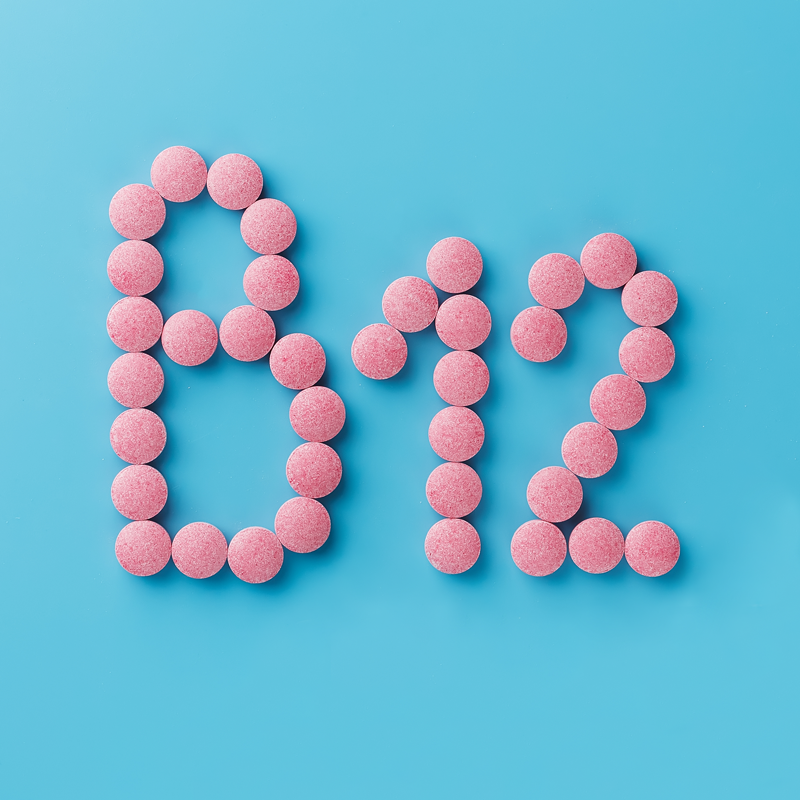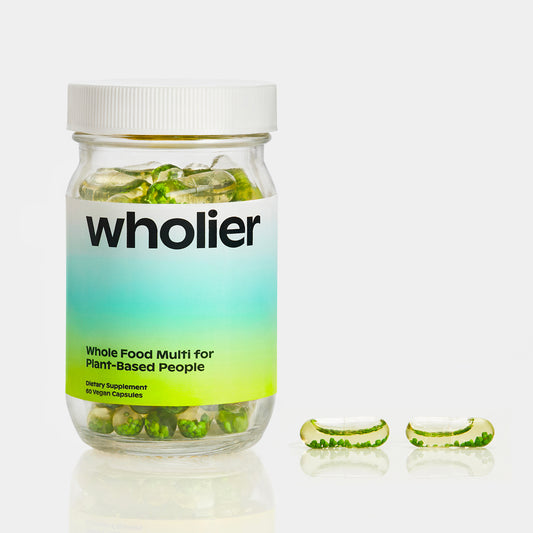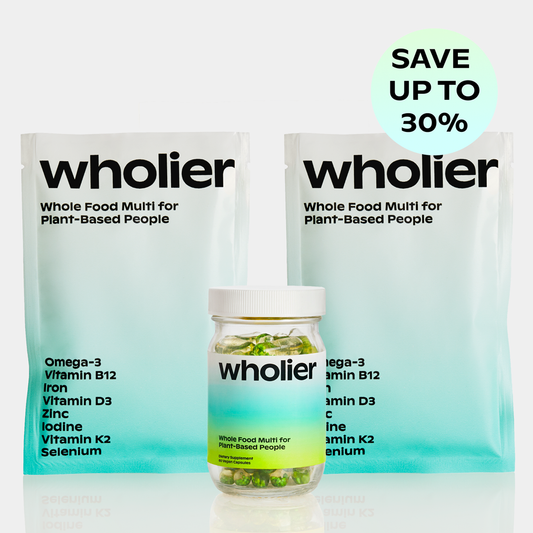
Vitamin B12: Cyanocobalamin or Methylcobalamin – Which is Better?
Vitamin B12 is an essential nutrient that plays a crucial role in many bodily processes, including the production of red blood cells and DNA synthesis. It also supports nerve function and brain health. Since our bodies can't produce B12 on their own, we need to get it from food or supplements.
When it comes to supplementing with vitamin B12, there are several different forms available. The two most commonly used forms are cyanocobalamin and methylcobalamin. While both types can effectively raise levels of vitamin B12 in the body, they differ significantly in terms of bioavailability and potential benefits.
Understanding Cyanocobalamin: The Cheaper Option
Cyanocobalamin is by far the most common type of vitamin B12 supplement available today because it's cheaper as compared to other options like methylcobalamin.(1) Cyanocobalamin is synthesized by combining cobalt ion along with cyano group which results due to reaction between potassium cyanide and cobalt salt solution under acidic conditions.(2) Yes, you read that correctly, it’s made with cyanide, the highly toxic substance typically used for industrial purposes.
The main drawback associated with cyanocobalamin is that your body needs enzymes present within liver for its conversion into active form i.e methylcobalamin.This means you may not be able to fully absorb or utilize the vitamin B12 from cyanocobalamin if your liver is not functioning optimally.(3) There are also concerns about potential toxicity associated with long-term exposure to small amounts of cyanide that can be present in cyanocobalamin supplements. While this risk is generally considered low and most people do not experience any adverse effects from using these supplements, it's still an important factor to consider.
Understanding Methylcobalamin: The Active Form
Methylcobalamin is another form of vitamin B12 supplement available today, which has a higher bioavailability than other forms. It occurs naturally in animal-based foods such as meat, fish, and dairy products; therefore it does not require conversion within body for its activation i.e it’s already an active form unlike cyanocobalamin.(4)
Several studies have shown that methylcobalamin may offer additional benefits beyond supporting healthy levels of vitamin B12. For example, one study found that taking methylcobalamin helped improve nerve function among patients with diabetic neuropathy.(5) Another study reported that supplementation with methylcobalamin was effective at reducing symptoms of depression in elderly individuals.(6)
Other Forms Of Vitamin B12 Supplements
In addition to cyanocobalamin and methylcobalamin, there are other forms of vitamin B12 supplements available, including hydroxocobalamin and adenosylcobalamin. Hydroxocobalamin is a natural form of vitamin B12 that can be found in some foods but is also used as an injectable supplement for those with severe deficiencies.(7) Adenosylcobalamin, is another naturally occurring form of vitamin B12 that plays a role in energy metabolism.(8)
While these less common forms may have their own unique benefits or uses (such as injections for individuals with certain medical conditions), they are not typically recommended for everyday supplementation.
Controversy Surrounding Methylcobalamin vs. Cyanocobalamin
Despite the clear importance of maintaining healthy levels of vitamin B12 within the body, the topic remains controversial among healthcare professionals. Some doctors continue to recommend cyanocobalamin over methylcobalamin due to its lower cost and long-standing safety record. While others argue in favor of using methylcobalamin because it's more bioavailable and has potential additional health benefits beyond raising levels of vitamin B12.(9)
The controversy around this issue stems from different interpretations about what constitutes "optimal" levels of vitamin B12. While most people require only modest amounts per day, there are certain individuals who may require higher doses due to genetics, other health conditions or their diet. Additionally, some studies have suggested that even people with seemingly "normal" levels of vitamin B12 may still be at risk for deficiency-related symptoms if their levels fall below a certain threshold.(10)
So essentially, the debate arises from differences in opinion within the medical community regarding what level of vitamin B12 sufficiency is considered adequate and whether or not additional benefits beyond raising vitamin B12 levels are necessary, like the added benefits that come with methylcobalamin supplementation.
Clinical Studies on Cyanocobalamin vs. Methylcobalamin
Several clinical trials have compared the efficacy and safety of cyanocobalamin versus methylcobalamin supplementation in various populations. One study published in Diabetes Care found that diabetic patients who received daily injections of methylcobalamin experienced significant improvements in nerve function and pain relief compared to those receiving placebo treatment.(11) Another randomized controlled trial conducted among older adults found similar results – participants taking methylcobalamin supplements had significantly better cognitive performance than those taking cyanocobalamin supplements after 24 weeks.
Despite these positive findings, it's important to note that not all research has shown clear benefits associated with using one form over the other.(12) Some researchers argue that more long-term studies are needed before any definitive conclusions can be drawn about which type is best suited for different groups of people.
While there are multiple forms of vitamin B12 supplements available, the two most commonly used types are cyanocobalamin and methylcobalamin. Cyanocobalamin is the cheaper option but has potential drawbacks associated with its conversion into active form that may lead to decreased bioavailability in some individuals. Meanwhile, methylcobalamin is considered an "active" form of vitamin B12 since it does not need any further metabolism within the body for activation. It also offers additional benefits beyond just raising levels of vitamin B12 including improved cognitive function, energy production and healthy nerve functioning.
At wholier, we always use the active, bioavailable forms of each nutrient. That’s why we only use methylcobalamin for vitamin B12 in our supplements. However the choice you make is a matter of preference and recommendation from a medical professional based on your specific needs.
Sources:
(1) Herbert, V., & Das, K. (2011). Vitamin B12 in aging: defective transport as a contributing factor to the cause of dementia. Journal of the American Geriatrics Society, 59(4), 746-747.
(2) Watanabe, F., & Bito, T. (2018). Vitamin B12 sources and bioavailability.Experimental Biology and Medicine ,243(3),227–232.
(3) Jafarnejad S et al.. Methylcobalamin Effects on Diabetic Neuropathy and Nerve Protein Kinase C in Rats with Streptozotocin-induced Diabetes.Journal of Clinical Biochemistryand Nutrition .2009;44(2):111–117
(4) Ohta Y et al.. An easy method for preparation of pure crystalline methyl cobalamin.Biochimicaet BiophysicaActa.(BBA) -General Subjects .1997 ;1360:169 –176
(5) Paulionis L.Effectiveness Of And Preference For Cyanocobalamin Vs.Methylcobalin In Older Adults With Cognitive Impairment.Nursing Open .2020;00:1–10
(6) Vogiatzoglou A, Oulhaj A, Smith AD, Nurk E, Drevon CA, Ueland PM et al. Determinants of plasma methylmalonic acid in a large population: implications for assessment of vitamin B12 status.Clinical Chemistry .2009;55(2):219 –226.
(7) Bor MV et al..Daily Intake Of 4 To 7 Microg Dietary Vitamin B-12 Is Associated With Steady Concentrations Of Vitamin B-12-related Biomarkers In Healthy Young Women.Journalof Nutrition .2010 ;140(8):1433–1438.
(8) Zittan Eet.al.VitaminB12 Deficiency Among Patients Undergoing Metabolic and Weight LossSurgery : Causes , Diagnosis And Treatment.A Review.Medical ScienceMonitor Basic Research.2015 ;21:218–224
(9) SmithAD,VeveraJ,RichardsonAJ.TherapeuticuseofVitaminsinSchizophrenia.PsychiatricClinicsOfNorthAmerica .2013;36(1)407-422
(10) Foote JA,Murphy SP,Wilkinson En.Assessing The PrevalenceAndCorrelatesOfSubclinicalDeficienciesInAStatewideSample.JournalClinicalEndocrinologyMetabolism .2009 ;94(3):952–955
(11) Dangour AD et al.. B-vitamins and fatty acids in the prevention of cognitive decline and dementia.Proceedings of the Nutrition Society. 2012;71(1):62-8.
(12) Hoover EL, Strickland KM (2020) Methylcobalamin versus cyanocobalamin: are there any differences between their effects on cognition? a systematic review.International Journal of Neuroscience ,130(5),471–481





